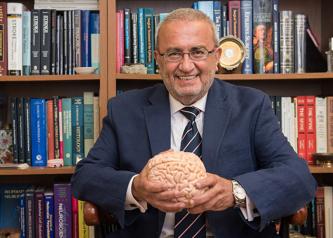

The John Harper Seeley Professor of Neurological Sciences
Dr. Issam Awad, MD is a neurosurgeon whose research focuses on brain hemorrhage and its treatment, and the biology and genetics of lesions causing hemorrhagic stroke. His active projects include NIH-funded investigations of molecular mechanisms involved in the formation and progression of cerebrovascular malformations. Additionally, he leads several clinical trials on minimally invasive techniques for surgical treatment of hemorrhagic stroke and novel drug therapies for Cavernous Angiomas With Symptomatic Hemorrhage (CASH). His publications spanning three decades have been cited more than 81,000 times in the published literature, the most of any neurosurgeon on Google Scholar.
Dr. Awad is deeply engaged in promoting international exchange and opportunity in his field. He founded and served as president of the World Association of Lebanese Neurosurgeons, with the goal of promoting professional connections among neurosurgeons of Lebanese descent. Since 2017, he has directed the Safadi Program of Excellence in Clinical and Translational Neuroscience, which connects clinicians and researchers to encourage cross-disciplinary partnerships related to neuroscience and awards pilot grants for early-stage translational research. The program was created thanks to a $5M donation from Mohamad Safadi, a Lebanese businessman, philanthropist, member of parliament, and former cabinet minister who was first treated by Dr. Awad in 2012. Dr. Awad is also engaged in establishing the Pan-American CASH Consortium, a collaboration with Universitário Clementino Fraga Filho through which Brazil- and US-based scholars work together to validate and harmonize data and protocols for a new blood test predicting brain hemorrhage in cavernous angioma across diverse populations.
Q: Why is international collaboration important in your field?
A: We aim to mentor and encourage scientific career paths at various levels of career development in teams and at universities around the world. This enhances and broadens the impact of novel discoveries and evidence-based medicine. It also promotes greater diversity of the scientific workforce and allows the validation of scientific concepts and tools in broader populations and clinical settings.
Q: How has your work with international partners been beneficial to you and your career, personally?
A: As a foreign born naturalized American citizen, I have always belonged to my native and adopted societies, and this has motivated me to share my educational, clinical and scientific expertise more broadly, and with greater impact. I have trained students and fellows who are now leading clinical and research teams in different countries, and this has facilitated collaborations and added immense satisfaction through sprawling friendships. The same is true though treating patients from around the world. For example, my collaboration with the Federal University in Rio de Janeiro was catalyzed through a former fellow who trained with me two decades ago, and later became the chairman of the Department in Brazil; and family members with a rare disease I study, who became leading patient advocates in South America. And of course I was honored to treat His Excellency Minister Mohamad Safadi from Lebanon, who later funded the Program of Excellence in Clinical and Translational Neurosciences at the University of Chicago.